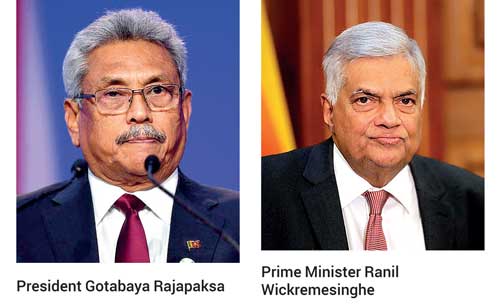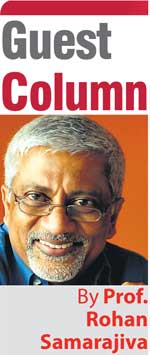Wednesday Feb 18, 2026
Wednesday Feb 18, 2026
Tuesday, 12 July 2022 00:52 - - {{hitsCtrl.values.hits}}
The Constitution lays out a clear path for what happens when the President resigns. Either the Prime Minister, or if that office is vacant, the Speaker, will act as President. In less than 30 days, the new President will be elected through a secret ballot from among the qualified MPs. The detailed procedure is laid down in the Presidential Elections (Special Provisions) Act, No. 2 of 1981.
What is less clear is what happens when both the President and PM resign simultaneously, or the PM resigns ahead of the President, which is what the protesters and apparently the party leaders want. As the PM resigns, the Cabinet is automatically dissolved. As the Cabinet dissolves, all Secretaries cease to hold office. Not only the Government but entire State apparatus ceases to function. Those of us in State service at the outset of the Anti-Constitutional Coup of 2018 have recent memories of trying to make payments and run our agencies without functioning ministries.
There will be no one to negotiate with the IMF, other than the Governor of the Central Bank. There may be no one to approve payments for the advisors handling the debt restructuring, depending on how the contracts have been framed. The IMF process has already been suspended. The rest will slow down or stop. In a situation where fuel is supplied under spot market conditions with payments being made in an ad hoc manner, it is likely that these supplies will cease or at least slow down. Those offering humanitarian aid will have no one to talk to.
That excited protestors demanded the virtual cessation of the state is unsurprising. What is not is that the experienced politicians participating in the party leaders’ meeting on 9 July, except one, ignored the ramifications of the call for simultaneous resignations. This cannot be explained in terms of ignorance of the law. It is a continuation of the unholy compact between our political leaders and the people, where the leaders tell the people what they want to hear even if it leads to disaster.
The way out
Now that the demand for simultaneous resignations has been entrenched, what is the path out of this mess which will minimise the damage?
It is most important that the party leaders decide before 13 July who the new Prime Minister will be. This should be in the form of a letter with an adequate number of signatures which indicates that the said MP “is most likely to command the confidence of Parliament.” The moment the Speaker commences acting in the office of the President, this letter should be handed over to him, emphasising the importance of minimising the gap between the resignation of the current Prime Minister and his successor. The appointment can be instantly, if the Speaker wishes.
It would be good if the party leaders could also come up with a set of names of those who can serve in Cabinet. This will help the Speaker and the PM to at least establish a core Cabinet. Ideally, these individuals and the Prime Minister would have committed to a Common Minimum Program on which discussions have been underway for some time.
The Speaker should immediately issue a gazette notification listing 15-18 Ministries (already identified by multiple organisations) and appointing secretaries to each of them, while the political negotiations on the Cabinet are ongoing. At least the critical appointments such as those of secretaries for the Ministries of Finance and Power and Energy should be made without delay.
The above actions, if taken in a rapid (and where possible, parallel) sequence commencing from the receipt of the resignation letter of the President, may prevent the country from sliding into a power vacuum and an even worse economic and political crisis than the one we are now mired in.
The path to avoid
Assume the two resignations are submitted on 13 July and the Speaker begins to act in office of the President as set out in the Constitution. In addition to implementing the procedures set out in Presidential Elections (Special Provisions) Act, No. 2 of 1981, he has to engage in various negotiations with potential Prime Ministers and Cabinet Members, within his physical constraints.
Unless he puts them all in one room and engages in a collective negotiation, the process is likely to take a lot of time. If there is no pre-determined list of ministries, the horse trading will become even more complex and will take more time, especially because the Speaker carries none of authority a normal Sri Lankan President wields. The result will be another crazy quilt of Ministries, surpassing all in recent memory.
While all this is going on, the economy will go from bad to worse. More of those with the wherewithal will get out if the airport is operational and flights are available. Even now, some foreign airlines are not taking bookings that would commit them to take return-ticket holders out of Sri Lanka in July and August. The families of some of the members of the political class have already relocated. It may be expected that their numbers will swell to include sitting MPs, as the crisis deepens. The desperation of those stuck here will increase.
Given the inability of elected politicians to solve the problems besetting them, people will start to look to other institutions. Already a President in hiding has created opportunities for the Chief of Defence Staff to address the nation and to serve as interlocutor to the President. Even though a military takeover is unlikely because of the severity of the economic crisis, this will strengthen the parallel power structures that the Rajapaksas promoted. It may be expected that military men sans uniforms will play major roles in future political developments, despite the abject failure of the current President.